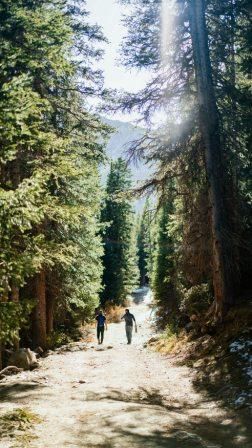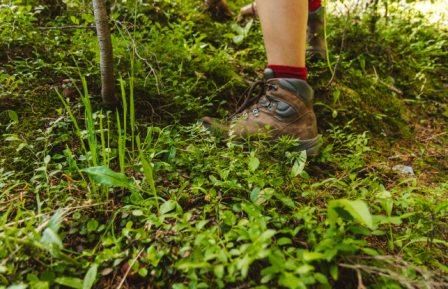Colorado Parks and Wildlife Commission Approves 20 Recreational Trail Grants
Non-Motorized Trail Grants
There were a total of 20 Recreational Trail Grants funded this year totaling $3,520,752. Statewide Trails Program Manager Fletcher Jacobs highlighted the Colorado Recreational Trails Committee’s wildlife review process and the importance of balancing wildlife and habitat needs with recreation needs in Colorado. “These trail projects will connect Coloradans to the outdoors with new and improved trails and provide more places for everyone to get outside,” Jacobs said.
The Non-motorized Trail Grant Program is a multi-agency funding partnership that includes Great Outdoors Colorado, Colorado Lottery, Federal Recreational Trails Program funds and Federal Land and Water Conservation funds. This grant program provides funding for trail planning projects as well as small and large trail construction and maintenance projects. .
Grant Stats
Construction
3 grants totaling $749,487
Maintenance
9 grants totaling $1,009,228
Planning
2 grants totaling $89,300
Support
2 grants totaling $90,000
Land and Water Conservation Fund
4 grants totaling $1,582,752
Some of the highlights from this year’s awarded projects include:

North Mt. Elbert Trail Maintenance (Maintenance Grant)
This $245,000 grant award will allow the National Forest Foundation to work with the Leadville Ranger District, local youth corps crews, and other partners to complete the final rehabilitation phase of a multi-year project on Colorado’s highest peak. This phase will prioritize needs on 3.5 miles of the North Mt. Elbert Trail for maintenance and restoration, including a 0.25-mile technical trail alignment between 13,400 and 13,680 feet. The NFF and partners will maintain and restore the fragile alpine tundra and ensure long-term sustainable access to the summit.
Mesa County Trail Maintenance (Maintenance Grant)
Mesa County Public Health was awarded a $114,500 dollar grant to fund a non-motorized trail maintenance crew for the coming summer. With support from the BLM, USFS and Western CO Conservation Corps, crews will focus on maintenance needs throughout Mesa County. They will predominantly work on three main trail systems managed by the BLM (Kokopelli, North Fruita Desert and Lunch Loops) as well as Forest Service lands on the Grand Mesa and Uncompahgre National Forests. The labor consists of technical rockwork, re-vegetation of social trails, erosion control, tread rehabilitation and corridor clearing.
Elk Creek – Colorado Trail Avalanches (Maintenance Grant)
The Columbine Ranger District was awarded a $55,810 dollar grant to address the historic avalanche cycle of 2019. These avalanches left four large debris fields along the Elk Creek section of the Colorado Trail in the Weminuche Wilderness. The Forest Service will use these resources to start a large-scale trail-clearing project with crews to work with crosscut saws, rigging equipment and digging tools.
Daniel’s Pass, Phase 1 (Construction Grant)
The City of Colorado Springs was awarded a $250,000 award to fund the Phase 1 of the Daniel’s Pass Trail System. This system is located in one of the city’s most popular regional parks – North Cheyenne Cañon Park. Construction of the new Daniel’s Pass Trail will include trailhead development, 3.4 miles of new sustainable soft surface trail, two pedestrian fiberglass bridges, trail wayfinding and interpretive signage. Over a mile of unsustainable social trails will be closed and then restored.
Overland Mountain Bike Association Trail Agent Project (Maintenance Grant)
Overland Mountain Bike Association was awarded a $44,425 grant to start their Trail Agent Project. OMBA Trail Agents will evaluate all 110 miles of non-motorized multi-use trails open to biking in the Arapahoe-Roosevelt National Forest’s Canyon Lakes Ranger District. Work will include corridor clearing, improving drainage features, minor re-routes and tread stability improvements. Agents will carry packable tools while riding mountain bikes to conduct necessary maintenance as the above issues are encountered. Formal trail surveys with guidance from Forest District staff will be done to determine additional trail needs, such as major maintenance or larger re-routes.
Heron Pond-Carpio-Sanguinette Park, Phase 2 (Land and Water Conservation Fund Construction Grant)
The City and County of Denver was awarded a $750,000 LWCF grant to complete Phase II of the Heron Pond-Carpio-Sanguinette Park. The 80-acre park is located in the community of Globeville, just northwest of downtown Denver. Phase II will build the Alameda trail access nodes and install lighting to improve safety along the trail. The Alameda is a 60-foot-wide tree-lined path made of concrete and crusher fines. This includes four new access points with trail wayfinding to encourage increased use of the park.
Naturita Town Park Perimeter Trail (Land and Water Conservation Fund Construction Grant)
The Town of Naturia was awarded a $320,760 LWCF grant to construct a perimeter trail loop around the existing Town Park. The half-mile concrete loop will provide a safe, easy place to walk, roller blade, or bike and will be ADA accessible. The majority of the trail will be six feet wide and a small portion that runs adjacent to the San Miguel River will be 10 feet wide. The trail will also be a starting point for future connecting trail systems.
A complete list of the Recreational Trail Grants is available here.
 About the grant process
About the grant process
The Colorado Recreational Trails Committee is responsible for the review process for the trail grant applications and makes recommendations to the Colorado Parks and Wildlife Commission regarding funding for grants.
The non-motorized trail grant selection process follows a three-tiered recommendation and approval process. Applications are first evaluated and scored by State Trails Subcommittee members, volunteer outside reviewers, State Trails Committee members, and trails program staff, who rank the applications in an order of recommended funding priorities. The ranked applications are submitted to the State Trails Committee which evaluates and recommends projects to the Parks and Wildlife Commission.
Click here for more information about CPW’s Recreational Trails Program.
~Colorado Parks & Wildlife
Selling Your Home?
Get your home's value - our custom reports include accurate and up to date information.




